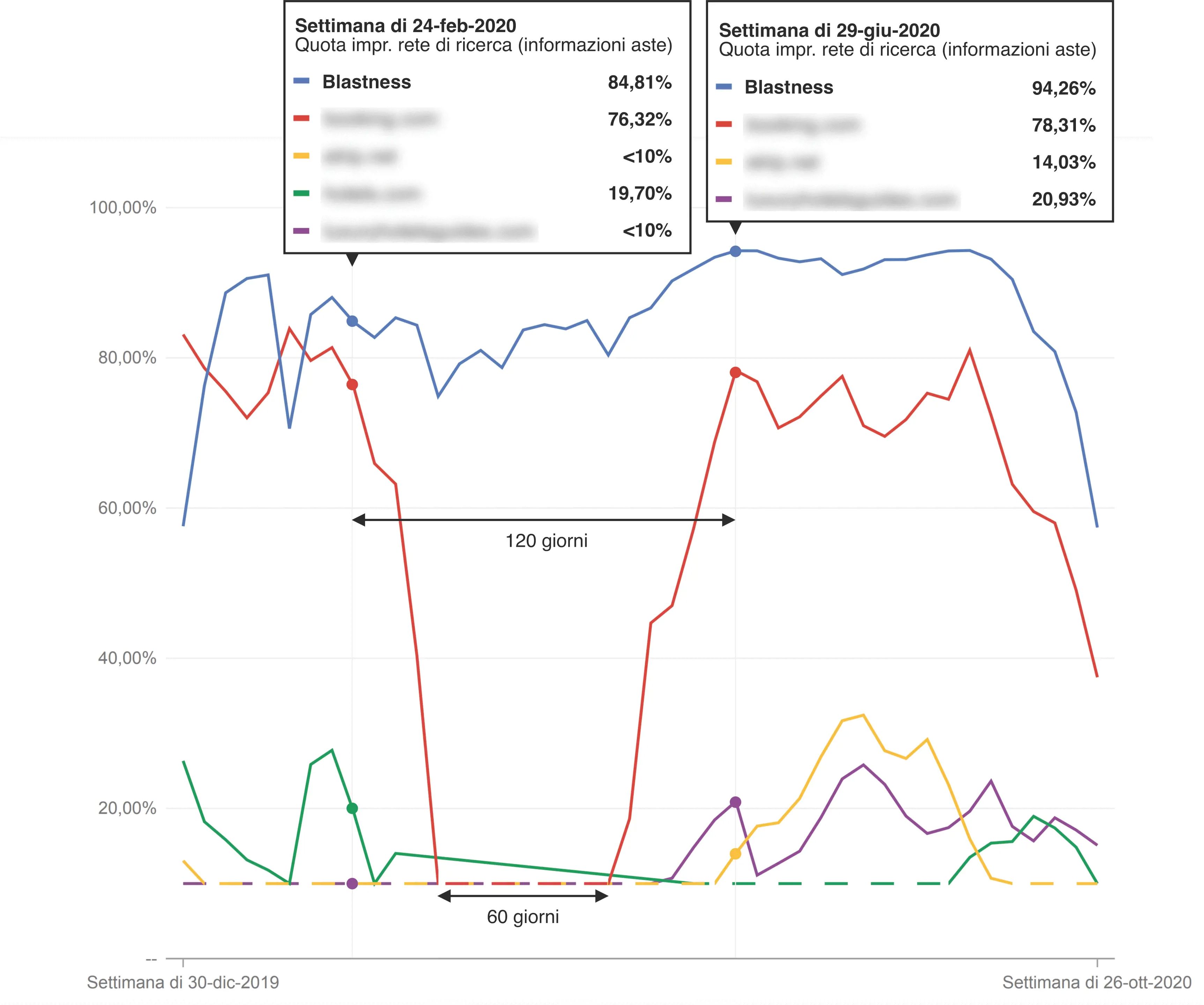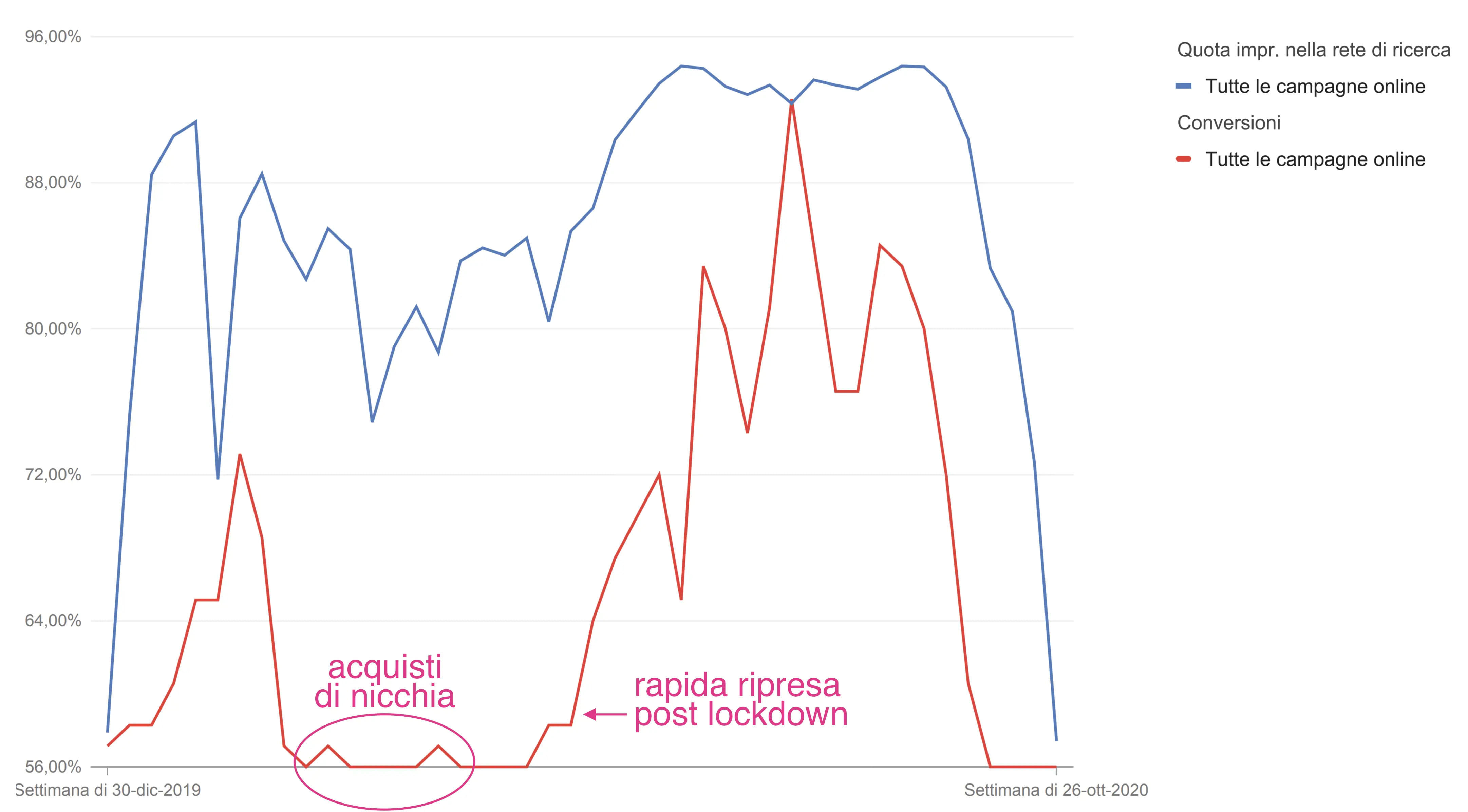PPC Campaigns for Hotels: The “Always On” Approach
Published in: December 2020
2020: The Year of the COVID-19 Emergency — an Annus Horribilis for the Entire Tourism Sector.
A health and social crisis without precedent, marked by sudden uncertainty that triggered a collapse in bookings and a dramatic surge in cancellations, with immediate repercussions for everyone in the industry.
But it also marked a turning point for digital travel.
Netcomm published a study showing that the early months of the health crisis led to a 10-year leap forward in digital adoption. In Italy alone, from January to May 2020, the number of new online consumers tripled compared to 2019. These new digital habits — according to Think with Google, Google’s official insights hub — demand that companies not only adapt quickly, but also maintain a consistent presence throughout the customer decision-making process, in order to drive results at key moments.
Below is a closer look at how Blastness manages its Always On approach to online advertising campaigns — confirming both the importance of constant visibility and Google’s increasingly pivotal role in supporting hotels.
With purchases nearly at a standstill, many argued that Pay Per Click (PPC) campaigns aimed at selling hotel rooms were simply a waste of budget. Several players in the industry — including major ones — chose to gradually reduce their online visibility efforts, eventually suspending them entirely.
Blastness, on the other hand — despite operating with a fully performance-based compensation model, tied to the value of the conversions generated by its advertising activities — continued to manage PPC campaigns consistently and flexibly, even at the height of the pandemic.
This careful Always On approach achieved two key goals from March onward:
- Uninterrupted, high-level visibility for hotel official websites during a time of urgent need, despite minimal conversion volumes;
- Maximum performance during recovery, allowing campaigns to handle surging demand when the market reopened, shifting bookings back to hotels’ official sites and reducing reliance on intermediaries — a clear win for hoteliers.
A Winning Strategy — Backed by Data
The graph below shows the trend of the Impression Share — the percentage of impressions ads receive compared to the total number they could receive — for the PPC campaigns of a Blastness client hotel (representative of the entire client portfolio).
It clearly illustrates how all other advertisers — including the major OTAs — began drastically reducing their campaign visibility during the week of Italy’s first COVID containment decree (late February 2020), viewing advertising as an unnecessary expense. Within about a month, most had completely shut down their campaigns, only cautiously resuming them after the first lockdown ended (late May 2020).
In stark contrast, our Always On strategy ensured approximately four months of uninterrupted visibility for our PPC campaigns, with an ad impression share close to 100%. This presence was crucial not only for capturing purchases, but also for supporting the crucial dreaming and planning stages of the customer journey, which play a key role in future travel decisions.

Maintaining continuity in advertising operations allowed us to:
capture “residual” niche demand from users who were still booking, even during highly unpredictable periods;
fully align with Google’s Best Practices, a set of recommendations designed to maximize ad efficiency — practices that Blastness consistently follows as a Google Premier Partner.
In fact, recovering campaign performance after a pause can be a slow process, often taking weeks to regain full visibility.
As clearly shown, the moment users confidently returned to the market and resumed online booking activity, the competitive advantage gained through sustained visibility ensured the direct sales channel was able to restart quickly and effectively.

What Made This Approach Possible?
The Always On strategy for hotel PPC campaigns — built on precise setup and strict adherence to online advertising best practices — was driven by the FOX Bid Management System (BMS). This is Blastness’s proprietary, cutting-edge technology platform, powered by Artificial Intelligence and Machine Learning algorithms. Integrated with Business Intelligence data, it was developed to consistently maximize ad performance in any context and at any time.
With a results-oriented focus, the BMS leverages a dynamic budget model that adapts ad visibility to real-time market demand. By adjusting investment levels based on search volume fluctuations, it enables the efficient management of large keyword sets across campaigns running in multiple countries.